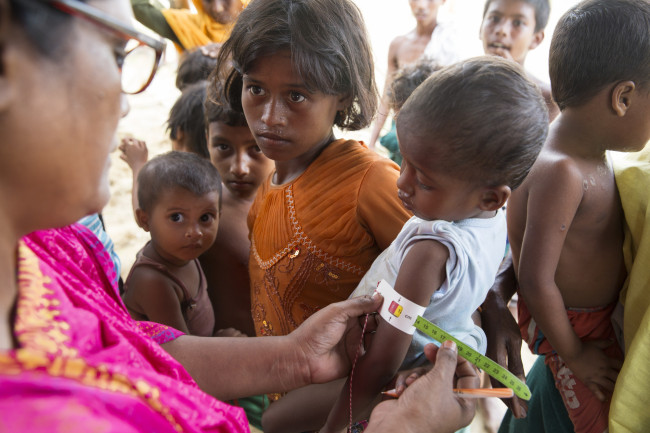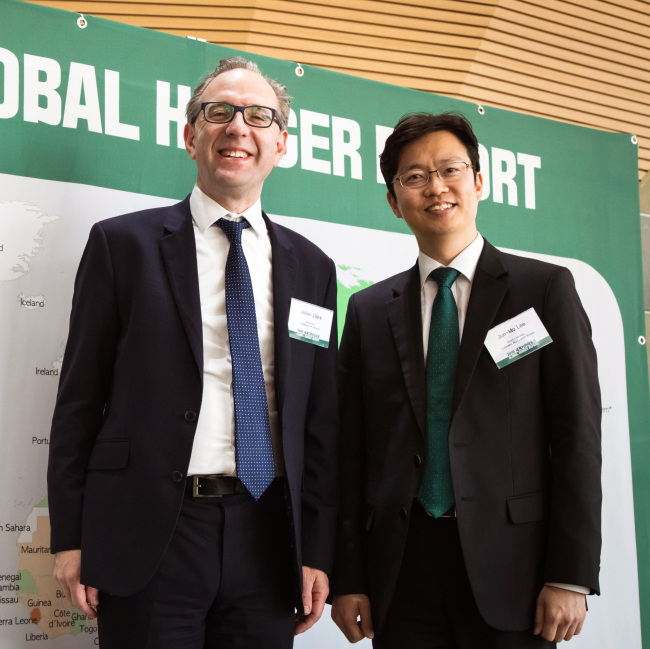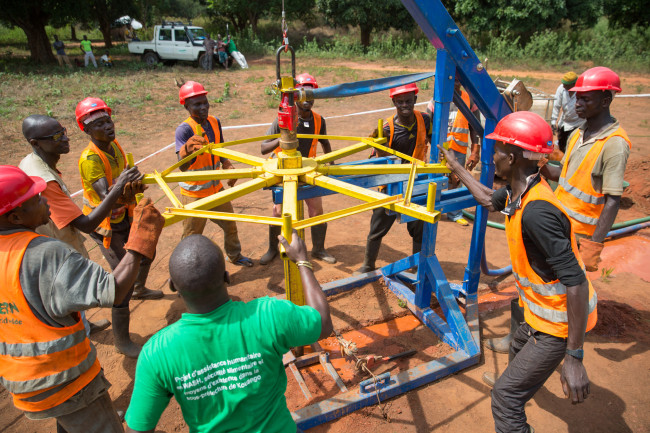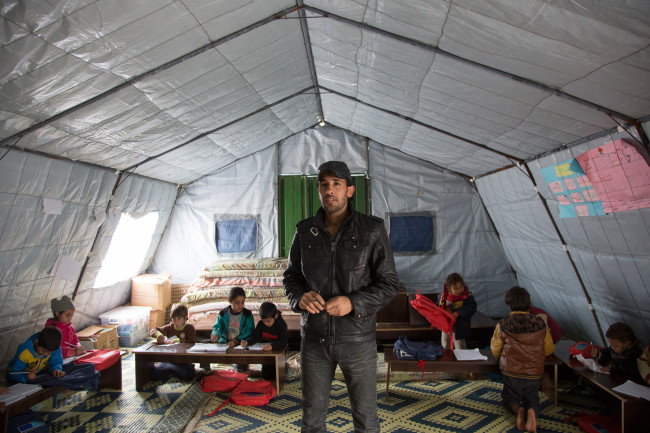[Herald Interview] Irish aid reaches most vulnerable with compassionate passion
“The Great Famine (a period of mass starvation, disease and emigration in Ireland from 1845-49) still has immediacy in our consciousness, and people are still aware of it.”
By Joel LeePublished : Nov. 26, 2018 - 17:28

Imagine the following situation: A mother and her children are abused by their husband-father, starved, beaten and neglected over a long time.
Without outside help, they might not survive.
If you heard the news, would you exhort the father to rectify his behavior, then simply turn a deaf ear? Or, knowing there’s no hope in him, take matters into your own hands to help them?
The latter approach -- helping the world’s most vulnerable based on need -- has essentially been the strategy of Irish humanitarian aid and its largest aid and humanitarian agency, Concern Worldwide.
“The suffering of hunger and injustice of hunger are something that resonates a lot with Irish people,” Irish Ambassador to Korea Julian Clare told The Korea Herald last week following the publication of the Global Hunger Index by Concern Worldwide on Nov. 20.
“The Great Famine (a period of mass starvation, disease and emigration in Ireland from 1845-49) still has immediacy in our consciousness, and people are still aware of it. It’s worth noting that our population has never recovered to the level of 1845 since.”

Founded in 1968 in the wake of the Biafra Famine in Nigeria, Concern Worldwide has marked its presence in all of the world’s major crises since, tackling poverty, epidemics, broken sanitation systems and natural disasters. It currently operates in 27 of the world’s poorest countries, employing nearly 4,000 staff members, including 3,000 locals. Over 90 percent of Concern staff members work in the field, providing direct assistance to people who need help. The nongovernmental organization has lent assistance to 23 million people in poverty in 2016 -- its largest figure since 1968 -- and spent over $200 million in the process.
The organization opened its Korea office in 2015.
“Irish people have been historically supportive of overseas aid through difficult as well as prosperous times. We are one of the highest per capita contributors in the world in terms of charity donations,” said Clare, adding that Concern receives a large portion of its collections from public donations aside from governmental and institutional support.
In 2016, among the Organization for Cooperation and Economic Development’s Development Assistance Committee member states, the envoy said, Ireland spent 56 percent of its bilateral ODA on the world’s least-developed countries.
“Our aim is to reach the poorest of the poor and reach them first, which is very much the spirit of Concern,” he said, adding Irish aid has reached 27 million people worldwide. “Our work focuses on nutrition, agriculture and creation of seed banks, maternal and child help, education, health care, climate action, water provision, sanitation and hygiene, women’s empowerment as well as HIV-AIDS prevention.”
Noting that these efforts aim to make “tangible and sustainable changes” in distressed people’s lives, Clare said that Ireland’s humanitarian work tries to bridge the “humanitarian gap” between needs and resources while incorporating development to make stressed communities resilient, self-sufficient and durable.
“The Irish ODA analyzes how conflict drives migration, violence and hunger, and works hand in hand for a political solution to root out problems,” he said. “Our official international development agency, Irish Aid, is in the process of drafting a new aid strategy with an ambition to increase our ODA -- including humanitarian aid and development cooperation -- to 0.7 percent of our gross national income, which is also the collective goal of the European Union.”
According to the Irish Embassy in Seoul, Dublin spent 0.32 percent of its GNI on ODA (over $840 million) last year through United Nations agencies, EU institutions and other international nongovernmental organizations.

Turning to relations with Korea, Clare said “both nations have experienced hardship, hunger and conflict, but have made themselves into modern, outward-looking and prosperous trading nations.”
“We both have a sense of where we come from and a desire to use our prosperity for the benefit of others,” he added.
In a separate interview, Concern Worldwide Korea Country Manager Lee Jun-mo pointed out that the 2018 Global Hunger Index -- jointly published by Concern Worldwide and German charity Welthungerhilfe -- found that global hunger levels have worsened across many nations and hot spots, despite a 28 percent drop worldwide since 2000.
On Nov. 20 in Seoul, the Korea office hosted its second international conference, the 2018 Global Hunger Report, under the theme of “conflict, displacement and hunger.” The event shared lessons from Concern’s global programs and illuminated the plight of Yemenis and Rohingyas.
“It is staggering that 124 million people are suffering today from acute hunger and in some cases starvation,” said Concern’s Chief Executive Dominic MacSorley on the release of the report. “This is an increase from 80 million two years ago. And that means more people on the ground are dying from preventable causes, mostly conflict. And the majority of those who die are children.”

The study examined 119 countries and found that 51 had “serious” hunger levels. The Central African Republic was singled out as having an “extremely alarming” level -- the result of an ongoing conflict that has destroyed livelihoods and displaced millions.
The countries with “alarming” hunger levels were Chad, Haiti, Madagascar, Sierra Leone, Yemen and Zambia, while some of the 45 countries with “serious” levels included Afghanistan, North Korea, Kenya, Iraq, Myanmar and Bangladesh.
Hunger levels in the Democratic Republic of the Congo, Libya, Somalia, South Sudan and Syria could not be calculated due to political unrest and violence. By region, South Asia and sub-Saharan Africa had the world’s most alarming hunger levels.
“Many people stress the importance of a political solution to a particular humanitarian crisis, which is no doubt important, but Concern believes that helping the vulnerable must be done regardless of the political approach. Ultimately it is women, children and the innocent who bear the brunt of these man-made crises,” said Lee. “For South Korea to be a truly advanced nation and ODA powerhouse, we should nurture a global humanitarian perspective, not just thinking about ourselves or those near us.”
If the international community neglects people such as the Syrian refugees, Yemenis and Rohingya, their localities could become breeding grounds for further violence and terrorism, he argued.
The UN Sustainable Development Goals -- a list of 17 goals for the world to achieve for its sustainable development by 2030 -- pertain to eliminating poverty and hunger while promoting health, well-being, clean water and sanitation. But not enough effort has been made to drastically reduce hunger, he said.
The Korea office works with the Ministry of Foreign Affairs, the Ministry of Unification, the Korea International Cooperation Agency and other institutions, and raises funds from diverse strata of society.
Concern has operated in North Korea since 1998, working in food security, nutrition and water and sanitation services as well as strengthening the country’s disaster-risk reduction capacity. As one of five international NGOs in North Korea, Concern has 18 staff members working on projects in vulnerable areas, including Gangwon, North Hwanghae, South Hwanghae and South Pyongan provinces.
By Joel Lee (joel@heraldcorp.com)







![[KH Explains] Hyundai's full hybrid edge to pay off amid slow transition to pure EVs](http://res.heraldm.com/phpwas/restmb_idxmake.php?idx=644&simg=/content/image/2024/04/18/20240418050645_0.jpg&u=20240419100350)






![[From the Scene] Monks, Buddhists hail return of remains of Buddhas](http://res.heraldm.com/phpwas/restmb_idxmake.php?idx=652&simg=/content/image/2024/04/19/20240419050617_0.jpg&u=20240419175937)

![[KH Explains] Hyundai's full hybrid edge to pay off amid slow transition to pure EVs](http://res.heraldm.com/phpwas/restmb_idxmake.php?idx=652&simg=/content/image/2024/04/18/20240418050645_0.jpg&u=20240419100350)

![[Today’s K-pop] Illit drops debut single remix](http://res.heraldm.com/phpwas/restmb_idxmake.php?idx=642&simg=/content/image/2024/04/19/20240419050612_0.jpg&u=)